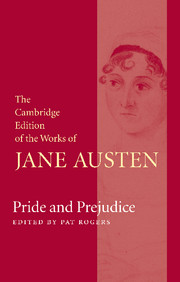Book contents
- Frontmatter
- Contents
- General Editor’s Preface
- Acknowledgements
- Chronology
- Introduction
- Note on the Text
- Pride and Prejudice
- Pride and Prejudice: Volume I
- Pride and Prejudice: Volume II
- Pride and Prejudice: Volume III
- Corrections and Emendations to 1813 text
- Appendix 1 Thomas Egerton and the Publication History
- Appendix 2 Legal and Military Background
- Appendix 3 Pemberley and its Models
- Appendix 4 Note on the second and third editions of Pride and Prejudice
- Abbreviations
- Explanatory Notes
Appendix 3 - Pemberley and its Models
Published online by Cambridge University Press: 19 December 2020
- Frontmatter
- Contents
- General Editor’s Preface
- Acknowledgements
- Chronology
- Introduction
- Note on the Text
- Pride and Prejudice
- Pride and Prejudice: Volume I
- Pride and Prejudice: Volume II
- Pride and Prejudice: Volume III
- Corrections and Emendations to 1813 text
- Appendix 1 Thomas Egerton and the Publication History
- Appendix 2 Legal and Military Background
- Appendix 3 Pemberley and its Models
- Appendix 4 Note on the second and third editions of Pride and Prejudice
- Abbreviations
- Explanatory Notes
Summary
Pemberley plays a significant role in the novel, as the site of a burgeoning reconciliation between hero and heroine, involving what in Aristotelian terms is called anagnorisis – a key moment of recognition near the dramatic climax. Here Darcy and Elizabeth will settle as a married couple after the end of the main narrative. Naturally, commentators have sought a model for this grand house and estate. Until recently the popular vote went to Chatsworth, the home of the Dukes of Devonshire, located two miles from Bakewell in Derbyshire (see vol. 3, ch. 1, n. 30). In late years a more sceptical note has become fashionable on this point. This appendix will set out briefly the reasons which support the view that Jane Austen probably had aspects of Chatsworth in mind when describing Pemberley, even though the house is not modelled in every detail on the real-life estate, and is imagined to exist on a far less palatial scale.
A Tudor mansion was built on this secluded site for Bess of Hardwick, a famous progenitor of the Cavendish family: the present house dates largely from the time of the first duke, in the 1680s and 1690s. It was renowned both for its richly decorated interior and for its spectacular gardens within a park redesigned by Capability Brown. A visitor in the 1790s would have known that the chatelaine was Georgiana, Duchess of Devonshire (1757–1806), the celebrated beauty and social figure. While Austen probably did not herself get as far as Derbyshire, she would have had ample opportunity to read descriptions of the house and gardens by travellers such as William Gilpin. Most contemporary readers would certainly have thought of Chatsworth when the novel presented them with a great house located in this precise corner of England. It was one of the earliest properties to figure on the itinerary of stately homes, and as early as 1760 the then duke had limited the hours within which visitors could follow a conducted tour by the housekeeper (see vol. 3, ch. 1, n. 4).
Information
- Type
- Chapter
- Information
- Pride and Prejudice , pp. 452 - 455Publisher: Cambridge University PressPrint publication year: 2006
